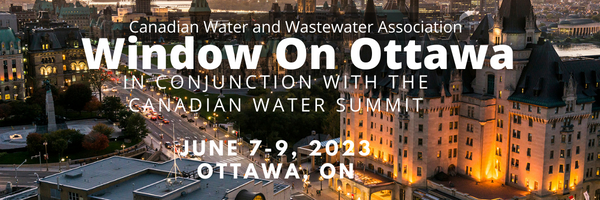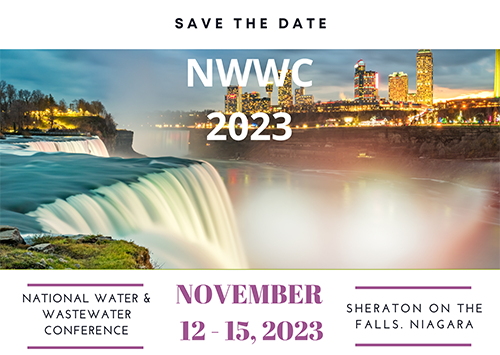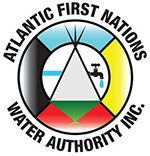 |
||||||||||||
| Subscribe | Past Issues | www.cwwa.ca | Water Source Magazine | ||||||||||||
|
CWWA News
We did it! We had a real, live, national conference again! What a joy to see so many friends and colleagues in Halifax for the National Water & Wastewater Conference. Despite ongoing covid-19 fears, some lingering travel restrictions, and even an airline system shutting down, we were able to gather once more. We’re excited to announce that we’re again collaborating with Water Canada to host the 2023 Window on Ottawa as part of the 14th annual Canadian Water Summit. Mark your calendars for June 7 – June 9, 2023. Be sure to join us at the Delta Hotel in Ottawa! The CWS facilitates cooperation, collaboration, and knowledge-sharing among the many diverse groups that make up our Canadian water landscape as we advance our mission to build Canada’s ‘Blue Economy’. The Window on Ottawa portion will focus on federal and national water initiatives and give our members access to senior policy development teams at the federal government. We cover a range of topics related to drinking water, wastewater, and stormwater at each of our events. During each of our sessions, we have discussions about policies, projects, and innovations in the Canadian water industry and beyond. With no in person events or meetings, our Board of Directors have been continuing to serve the Association over phone calls and MS Teams, the NWWC was the first chance for an in-person meeting in 3 years. The meeting focused primarily on strategic planning and setting priorities for 2023 and beyond. Federal Initiatives
This recently-posted document is intended to provide guidance to decision-making pursuant to the Impact Assessment Act, the Canadian Navigable Waters Act, the Canadian Energy Regulator Act, and the fish and fish habitat protection provisions of the Fisheries Act. Access the Framework. Canada’s Energy Regulator (CER) recently announced the launch of a new search tool capable of providing easy access to regulatory data. The “BERDI” (Biophysical, Socio-Economic, and Regional Data and Information) tool allows users to more easily search data from environmental and socio-economic assessments submitted to the CER as part of 40 pipeline applications since 2003, including more than 14,000 tables, 1,800 figures and 4,000 maps. Access CER’s BERDI promotional video at: https://www.youtube.com/watch?v=FTGbWD110Po Member News
CBC The Atlantic First Nations Water Authority has signed a transfer agreement with Indigenous Services Canada to take over water and wastewater management in 17 First Nations in the region. The communities will still need a ratifying vote to officially come aboard but Chief Ross Perley of Neqotkuk, a Wolastoqey community 120 kilometres northwest of Fredericton, said the agreement signed Nov. 7 in Halifax represents much-needed empowerment for First Nations. Provincial News
The Ontario Government has introduced an omnibus bill to expedite development of new housing in the Golden Horseshoe area. The Bill will among other things:
Snippings & Clippings
The Guardian More than 110 scientists and regulators worldwide are raising a public alarm over what they label “weak” PFAS drinking water limits proposed by the World Health Organization, which they charge used shoddy science and “arbitrarily” dismissed hundreds of studies linking the “forever chemicals” to serious health problems. Water Canada When spring arrived this past year in the town of Hay River, Northwest Territories, residents weren’t ready for what followed. River water levels reaching historic highs from heavy precipitation, winter snow levels, and spring breakup caused tens of millions of dollars in flood damage. One of the worst hit areas was the town’s water treatment plant, which was severely damaged, with reports estimating $10 million in repairs and an additional $20 million for mitigation. Water Canada Groundwater is the world’s largest freshwater resource. But because it’s deep underground, signs of overuse aren’t always obvious. And with population growth and increased demands for water on the rise, groundwater resources are becoming vulnerable. AP News Michigan officials said Wednesday that nearly all of the lead pipes in Benton Harbor, Michigan, have been replaced roughly a year after a lead water crisis forced residents to avoid their tap water and use bottled water for simple tasks like cooking and drinking. Water Canada COVID-19 wastewater surveillance networks are being established in the province. The initial pilot sites include the greater Moncton area and Natoaganeg First Nation. Additional sites are being investigated with support from the provincial and federal governments. CBC News Two communities in southern Saskatchewan officially cut the ribbon Tuesday on a new $3.3-million wastewater treatment facility that is being touted as eco-responsible and award-winning. Water Online The Infrastructure Investment and Jobs Act (IIJA) provides much-anticipated funding for our nation’s infrastructure. The IIJA was enacted and included the Build America, Buy America Act (BABAA), which now requires all recipients of federal infrastructure funding to use products manufactured in the U.S. — not just projects funded directly through the IIJA. |
||||||||||||




